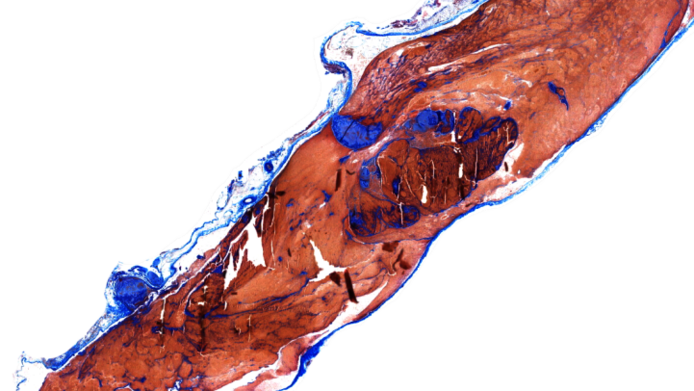Underrated risk factor for thrombotic tendency

For the gastroenterologist Christoph Gasche, it all began with screening the blood work of a risk group: patients with chronic inflammatory bowel diseases such as Crohn's disease or ulcerative colitis. As a result of the disease, they lose blood via the intestine and, along with it, the oxygen transporter haemoglobin, which mainly consists of iron. The precise analysis of the blood counts also revealed a side effect, namely thrombocytosis. Thrombocytosis is characterized by a pathologically increased amount of blood platelets (thrombocytes) in the blood. A first study showed that iron deficiency stimulates platelet production and that iron infusions improve the general well-being of patients with intestinal diseases. Today, a supplementary iron therapy is a treatment standard. “The fact that blood platelets multiply in the case of iron deficiency was surprising, since all the other cell systems are shut down. Every cell needs iron, so they stop growing if there is a deficiency,” notes the principal investigator Christoph Gasche in describing the initial situation for an FWF-funded research project on the topic of iron deficiency and thrombosis.
The motto in case of blood loss: plugging holes
Since thrombocytes play a leading role in blood coagulation, the team at the Medical University of Vienna concluded that iron deficiency and clot formation were related. In clinical practice, thromboses, i.e. the formation of blood clots in veins or arteries, are known as a dreaded complication accompanying chronic inflammatory bowel disease: “Thromboses have various causes, but iron deficiency is a relatively frequent disorder. We are thus in pursuit of a previously neglected albeit important factor of mortality, the significance of which extends far beyond intestinal inflammation.” Blood loss is something that usually occurs in surgery, and for women of childbearing age it is even a monthly phenomenon. There is a high risk of thrombosis after surgery, and 20 percent of women under 50 have an iron deficiency - their risk of thrombosis is therefore higher than that of men. While dietary iron intake is possible, it is difficult and subject to strict limits. The hypothesis that suggested itself was that the production of platelets for more blood clotting was systemically useful for the body to stop bleeding. In lay terms, one could dub it as the body’s attempt to “plug holes”.
Blood clots form more quickly in case of anaemia
That means that an excess amount of blood platelets makes sense in the short term, but if it becomes permanent, thrombocytosis increases the risk of clot formation. The FWF project explored the influence of iron deficiency on venous and arterial blood coagulation in a rodent model. The doctoral student Kristine Jimenez compared three groups of healthy rats. Two groups were malnourished with regard to iron, but the second group received iron infusions. The control group received normal food. In order to examine the venous system, the inferior vena cava of the rodents in all three groups was tied in order to narrow the cross-section, and the development of a thrombus was observed by means of ultrasound. The thrombi were then subjected to histopathological examination. All groups formed thrombi, but the anaemic rodents formed larger plugs with a high platelet count in a shorter time. The control group and the rodents with iron substitution showed the same clot formation behaviour. For the arterial system, the researcher prepped the carotid artery in all three groups and then irritated it, which reliably activates coagulation within the blood vessel. Although blood pressure is much higher in the artery than in the vena cava, an occlusion also developed. Again, the development was faster and more pronounced in the malnourished rats. In a parallel process, Kristina Jimenez searched for biological activation markers on the megakaryocytes, i.e. those cells that form blood platelets, but has been unable to identify any as of yet. Such tests could help to identify quickly less obvious risk groups.
Good iron levels in preparation for surgery
“We were able to show that arterial and venous thrombi have similar paths of development in which iron deficiency is an important factor. At first glance, heart attacks and swollen legs have little in common, but iron deficiency-induced thrombosis is relevant for both and this is important owing to the widespread incidence of iron deficiency,” says Christoph Gasche in summarising the results. He would like the iron level to be taken into account in every surgery clearance in order to minimize the risk of thrombocytosis and not only rely on blood reserves - because every clot formation is potentially life-threatening. Next, the team intends to investigate chronic inflammatory bowel disease in mice. It is important to find out whether the platelet changes caused by iron deficiency have an influence on thrombosis formation and intestinal inflammation, and whether it is possible to treat the inflammation by means of iron supplements.
Personal details Christoph Gasche is an internal medicine specialist focusing on gastroenterology and hepatology. Between 1999 and 2001, his research at the University of California in San Diego was devoted to molecular and genetic aspects of inflammatory bowel disease and colorectal cancer. In addition to his work at the University Hospital, he works in the laboratory for "molecular carcinoma" at the Medical University of Vienna. Thanks to his research, iron infusions were established as the treatment standard for people with chronic inflammatory bowel disease. He is the founder of the Loha for Life competence centre for iron deficiency diseases.
Publications





